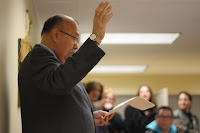Creating Momentum in Aboriginal Education
Consider this:
more than one-third of Aboriginal people of high school age or older have not
completed high school, and only eight per cent of Canadian Aboriginal people
between the ages of 25 and 64 have a university degree.
It’s easy to
see why Aboriginal education should be a policy priority for all levels of
government in Canada. Education, particularly at the college or university
level, is critical to helping all of us achieve our goals, support our
families, and compete in a quickly changing job market. Historically, few First
Nations students have had the tools or support to succeed in post-secondary
education. Fortunately, in the past few years, there are indications that this
tide is shifting.
 Recognizing
the challenge and the importance of providing support and access to education
for Aboriginal Canadians, the Association of Universities and Colleges of Canada (AUCC) has made Aboriginal education one of its priority policy
items and has been lobbying the federal government to increase funding for
Aboriginal students. The AUCC has also launched a number of dynamic online tools to create awareness and understanding of the success many young First
Nations students have achieved at the university level. Among these tools is a summary of opportunities in education across Canada for Aboriginal students. AUCC
has also produced a compilation of resources for Aboriginal students,
including a list of bursaries, indigenous services, transition programs, and
elder visits across the country.
Recognizing
the challenge and the importance of providing support and access to education
for Aboriginal Canadians, the Association of Universities and Colleges of Canada (AUCC) has made Aboriginal education one of its priority policy
items and has been lobbying the federal government to increase funding for
Aboriginal students. The AUCC has also launched a number of dynamic online tools to create awareness and understanding of the success many young First
Nations students have achieved at the university level. Among these tools is a summary of opportunities in education across Canada for Aboriginal students. AUCC
has also produced a compilation of resources for Aboriginal students,
including a list of bursaries, indigenous services, transition programs, and
elder visits across the country. Jenna Marr, a first-year Mi’kmaq student from
Indian Brook, is featured prominently as a success story in the AUCC database.
Jenna, one of the Mount’s student ambassadors, is currently studying in our Public Relations program, and has helped our recruitment team reach out to
prospective students through campus tours, special on-campus events, and school
visits. We’re proud of Jenna’s contributions and her work as a role model for
other Mi’kmaq youth.
Jenna Marr, a first-year Mi’kmaq student from
Indian Brook, is featured prominently as a success story in the AUCC database.
Jenna, one of the Mount’s student ambassadors, is currently studying in our Public Relations program, and has helped our recruitment team reach out to
prospective students through campus tours, special on-campus events, and school
visits. We’re proud of Jenna’s contributions and her work as a role model for
other Mi’kmaq youth.
At the Mount,
we’ve introduced a number of initiatives to better support and encourage
Mi’kmaq and other Aboriginal students. Our Aboriginal Advisory Committee has
been instrumental in giving insights to the university’s leadership team on how
we can do a better job of building a community where Aboriginal students are
able to achieve their goals. We also recently welcomed Art Stevens as the
Mount’s new Coordinator of Aboriginal Services to develop programming and
resources to support our First Nations students.
 Most
recently, on February 28, I was delighted to join staff, students, and special
guests from the community for the opening of the Mount’s Aboriginal Student Centre. The Centre was established as a community hub where students can
meet, chat, and have access to a resident counselor. Dr. Don Julien, Executive
Director of the Confederacy of Mainland Mi’kmaq and member of our Aboriginal
Advisory Committee, led us in prayer as part of the day’s ceremonies. We’re
grateful for his leadership and for the support, wisdom and guidance of all
members of our Advisory Committee.
Most
recently, on February 28, I was delighted to join staff, students, and special
guests from the community for the opening of the Mount’s Aboriginal Student Centre. The Centre was established as a community hub where students can
meet, chat, and have access to a resident counselor. Dr. Don Julien, Executive
Director of the Confederacy of Mainland Mi’kmaq and member of our Aboriginal
Advisory Committee, led us in prayer as part of the day’s ceremonies. We’re
grateful for his leadership and for the support, wisdom and guidance of all
members of our Advisory Committee.
Securing
access to education affects all of us, whether at the campus, community, or
national level. It’s vital—to our communities, our country, but most
importantly, to young Aboriginal students from across the country—to ensure we
are providing the tools for Aboriginal students to realize their dreams.
Until next time,
Ramona
2 comments:
Ramona, thanks for sharing this. It makes me feel those in College and University will work together with others to ensure that our children who are aboriginal living in inadequate homes, with no clean water, substandard education on and off reserves will sooner, rather than later, have what they need to thrive.
Joan
Joan O'Keefe, sc
Thanks, Joan, for your positive words of encouragement. Yes, ensuring that Aboriginal youth thrive should be a shared goal for all of us.
Ramona
Post a Comment